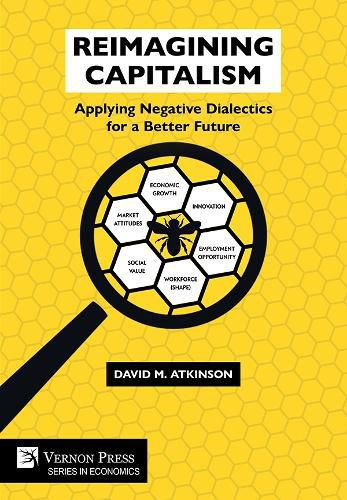Readings Newsletter
Become a Readings Member to make your shopping experience even easier.
Sign in or sign up for free!
You’re not far away from qualifying for FREE standard shipping within Australia
You’ve qualified for FREE standard shipping within Australia
The cart is loading…






This title is printed to order. This book may have been self-published. If so, we cannot guarantee the quality of the content. In the main most books will have gone through the editing process however some may not. We therefore suggest that you be aware of this before ordering this book. If in doubt check either the author or publisher’s details as we are unable to accept any returns unless they are faulty. Please contact us if you have any questions.
The Covid-19 pandemic reinforced the perception that capitalism is in crisis, that the future is volatile, uncertain, complex and ambiguous, and that, increasingly, our thinking about it and ability to manage and organize ourselves within it, are challenges we are ill-equipped for. Despite the efforts of many writers, and a surfeit of manuscripts concerning the need to rethink capitalism, questions concerning the struggle for social and economic justice remain unanswered.
While some suggest that with corrective action, businesses can save the world, there is an acceptance that they cannot do so alone. However, while governments might strengthen their institutions, enacting more effective policies, the challenge is simply laid bare at the feet of industry and commerce. Is the challenge to confront the establishment just too big to face?
Government institutions and the barons of industry and commerce are but interrelated, interconnected, interplaying components in one socio-economic system. This book offers readers a progressive, radical and academic provocation of that system; it also proposes a field of Applied Negative Dialectics.
In 'Reimagining Capitalism', Atkinson confronts the need to rethink capitalism and presents an integrated range of thinking through a lens of applied negative dialectics, questioning how and why things might have occurred, and where and how we might begin to improve them.
$9.00 standard shipping within Australia
FREE standard shipping within Australia for orders over $100.00
Express & International shipping calculated at checkout
This title is printed to order. This book may have been self-published. If so, we cannot guarantee the quality of the content. In the main most books will have gone through the editing process however some may not. We therefore suggest that you be aware of this before ordering this book. If in doubt check either the author or publisher’s details as we are unable to accept any returns unless they are faulty. Please contact us if you have any questions.
The Covid-19 pandemic reinforced the perception that capitalism is in crisis, that the future is volatile, uncertain, complex and ambiguous, and that, increasingly, our thinking about it and ability to manage and organize ourselves within it, are challenges we are ill-equipped for. Despite the efforts of many writers, and a surfeit of manuscripts concerning the need to rethink capitalism, questions concerning the struggle for social and economic justice remain unanswered.
While some suggest that with corrective action, businesses can save the world, there is an acceptance that they cannot do so alone. However, while governments might strengthen their institutions, enacting more effective policies, the challenge is simply laid bare at the feet of industry and commerce. Is the challenge to confront the establishment just too big to face?
Government institutions and the barons of industry and commerce are but interrelated, interconnected, interplaying components in one socio-economic system. This book offers readers a progressive, radical and academic provocation of that system; it also proposes a field of Applied Negative Dialectics.
In 'Reimagining Capitalism', Atkinson confronts the need to rethink capitalism and presents an integrated range of thinking through a lens of applied negative dialectics, questioning how and why things might have occurred, and where and how we might begin to improve them.